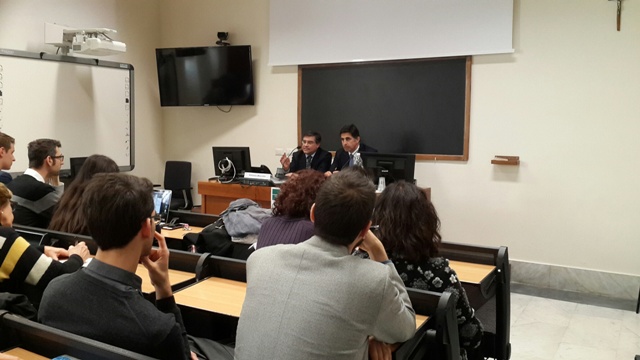



| Wednesday, 04 April 2018. | |
| Lecture by Ambassador Goran Aleksic at LUMSA University in Rome | |
| + larger fontnormal font- Smaller font |
 At the invitation by LUMSA University in Rome, Ambassador Aleksic gave a lecture to the students of the master's degree program "Experts in political science and international relations" on the topic "Balkan States and the European Union". The students are also members of the Observatory of Germany, Italy and Europe (OGIE). At the invitation by LUMSA University in Rome, Ambassador Aleksic gave a lecture to the students of the master's degree program "Experts in political science and international relations" on the topic "Balkan States and the European Union". The students are also members of the Observatory of Germany, Italy and Europe (OGIE).University's Chancellor Francesco Bonini made his keynote speech, thanking Ambassador Aleksic and the Embassy of the Republic of Serbia in Rome for attending the lecture. He underlined that the lecture in itself was continuation of cooperation with the institutions of Serbia, as LUMSA, i.e. its Department in Palermo, had already established cooperation with the University of Belgrade. With regard to the very topic of the lecture, Chancellor Bonini emphasized the importance of the European integration process of the Western Balkans and estimated that the process of the unification of Europe would not be complete without membership of the countries of the region. Moderator of the lecture was Professor of International Relations Antonio Maki, who is teaching "The History of the Balkans in the New Century" at LUMSA University. The Professor pointed out that after the wars of the '90s, the region made huge progress and that today, although in different stages, all countries of the region were on their path leading to EU membership. He expressed special pleasure at the attendance by the Ambassador of Serbia, being the largest and central country in the Balkan region and the leader in the European integration process. Underlining that full membership of the European Union was the top foreign policy priority for Serbia, Ambassador Aleksic outlined the chronology of Serbia's EU accession as well as the experience of our country in this process. He put special emphasis on the activities carried out by Serbia in the area of bilateral cooperation, both within the regional fora and in the promotion of bilateral relations with all neighbouring countries. The students were familiarized with the specificities of the negotiating process of Serbia, including the conditioning stemming from Chapter 35, i.e. the dialogue on the normalization of relations with Pristina, thus placing Serbia in an unequal position. He pointed out that even the EU did not have a unified position concerning the Kosovo and Metohija issue, bearing in mind the fact that five EU member states did not recognize the unilaterally declared independence of Kosovo. As to the dialogue, Ambassador Aleksic cited the problems faced by the Republic of Serbia, both with regard to the refusal of Pristina to fulfil its commitments from the dialogue and in light of the latest developments in Kosovo and Metohija in relation to the violent arrest of the Director of the Office for Kosovo and Metohija and beating up of the participants of the meeting on internal dialogue. He stressed that both these and other unilateral acts by Pristina, such as an attempt at joining international organizations and illegal formation of the Kosovo Security Forces, seriously endangered the dialogue and the possibility of arriving at a constructive solution. In addition to the issues specifically related the Republic of Serbia, the Ambassador also spoke about the internal issues faced by the EU (financial crisis, Brexit talks, migrant crisis, rise in Euroscepticism and populism), that had an impact on the level of the Union's commitment to the enlargement policy. In conclusion, Ambassador Aleksic underlined that Serbia was no doubt a part of Europe, committed to progress and further implementation of reforms, while the strong will of the political leadership and the citizens of Serbia was recognized by our European partners as well. After his lecture, there was an inter-active discussion with the attending students and professors that lasted more than an hour. The attendants were interested in the Belgrade-Pristina dialogue, the situation in Kosovo and Metohija, relations between Serbia and NATO and with Russia, support of the public in Serbia for its European integration and implementation of reforms as well as the expectations of Serbia in the context of the identity crisis that the EU faced. |